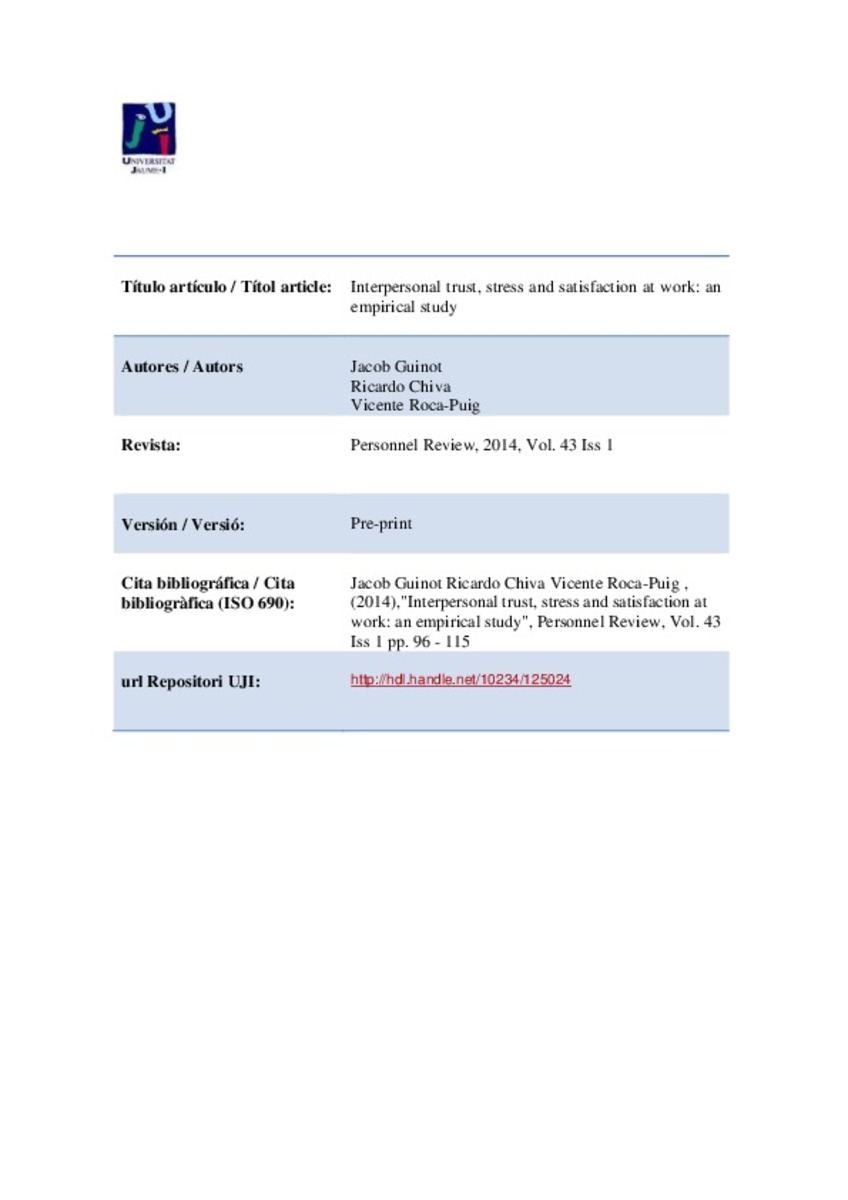Mostrar el registro sencillo del ítem
Interpersonal trust, stress and satisfaction at work: an empirical study
| dc.contributor.author | Guinot, Jacob | |
| dc.contributor.author | Chiva, Ricardo | |
| dc.contributor.author | Roca-Puig, Vicente | |
| dc.date.accessioned | 2015-06-23T17:32:54Z | |
| dc.date.available | 2015-06-23T17:32:54Z | |
| dc.date.issued | 2014 | |
| dc.identifier.citation | Jacob Guinot Ricardo Chiva Vicente Roca-Puig , (2014),"Interpersonal trust, stress and satisfaction at work: an empirical study", Personnel Review, Vol. 43 Iss 1 pp. 96 - 115 | ca_CA |
| dc.identifier.issn | 0048-3486 | |
| dc.identifier.uri | http://hdl.handle.net/10234/125024 | |
| dc.description.abstract | Purpose – Due to the divergent conclusions about the effects of interpersonal trust on job satisfaction, the study aims to look more deeply into this relationship by introducing job stress as a mediator variable. Design/methodology/approach – The paper uses structural equation modeling to analyze the opinions of 6,407 Spanish employees, taken from the 2008 Quality of Working Life Survey carried out by the Spanish Ministry of Labor and Immigration. Findings – The findings show that interpersonal trust has a positive effect on job satisfaction, and that job stress partially mediates this relationship. Furthermore, interpersonal trust is negatively related to job stress, which in turn is negatively related to job satisfaction. Research limitations/implications – Despite the pertinence and size of the database used in the study, it is very heterogeneous. Future research might delimit the database by organization size or sector. Qualitative studies may also improve our understanding of the relationships studied and enable other concepts to be included. Practical implications – Cultivating a climate of trust may provide organizations with a strategy to improve levels of mental well-being and satisfaction among their employees. Originality/value – This research explains why interpersonal trust has a positive effect on job satisfaction. The paper’s conceptualization of trust implies risk assumption and low risk perception; low perception of risk is presumed to reduce job stress, and in turn, increase job satisfaction. The paper also puts forward reasons for why “excessive” interpersonal trust has been related to negative effects on job satisfaction. “Excessive” trust might infer high risk perception, which might increase job stress, and in turn decrease job satisfaction. | ca_CA |
| dc.format.extent | 41 p. | ca_CA |
| dc.format.mimetype | application/pdf | ca_CA |
| dc.language.iso | eng | ca_CA |
| dc.publisher | Emerald Group Publishing Limited | ca_CA |
| dc.relation.isPartOf | Personnel Review, 2014, Vol. 43 Iss 1 | ca_CA |
| dc.rights | © Emerald Group Publishing Limited | ca_CA |
| dc.rights.uri | http://rightsstatements.org/vocab/InC/1.0/ | * |
| dc.subject | Job satisfaction | ca_CA |
| dc.subject | Quantitative | ca_CA |
| dc.subject | Interpersonal trust | ca_CA |
| dc.subject | Job stress | ca_CA |
| dc.title | Interpersonal trust, stress and satisfaction at work: an empirical study | ca_CA |
| dc.type | info:eu-repo/semantics/article | ca_CA |
| dc.identifier.doi | http://dx.doi.org/10.1108/PR-02-2012-0043 | |
| dc.rights.accessRights | info:eu-repo/semantics/openAccess | ca_CA |
| dc.relation.publisherVersion | http://www.emeraldinsight.com/doi/pdfplus/10.1108/PR-02-2012-0043 | ca_CA |
Ficheros en el ítem
Este ítem aparece en la(s) siguiente(s) colección(ones)
-
EMP_Articles [464]







